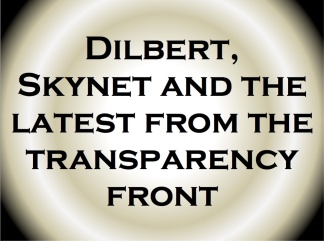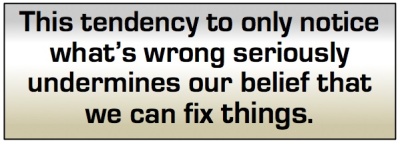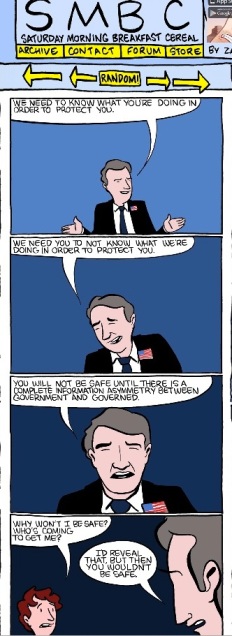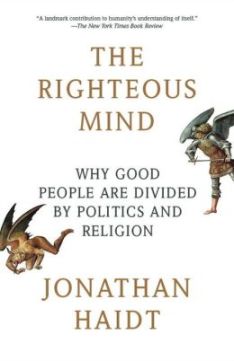Hm, well, that’s right in the general gist, though wrong in the specifics. What Scott is fumbling around — and that I made explicit in The Transparent Society (1997) — is that universal and pervasive surveillance can take us in either of two directions. One is toward Big Brother, if elites monopolize the omniscience and can surveil in secret, without accountability or supervision. In that case, you get what Vernor Vinge called “ubiquitous law enforcement.” And if the cops can’t arrest everyone? Then they’ll cherry-pick and arrest those whom they don’t like. In the specifics, Adams is dead wrong.
But Adams is floundering in the right direction when he holds “that a lack of privacy would lead to fewer activities being against the law. The only reason law enforcement can afford to act against drug users, or prostitution, or gambling, for example, is because only 1% of those crimes are detectable. If police could magically know every time someone violated a drug or prostitution law, the volume would be so high they would end up ignoring the entire class of crimes for purely practical reasons. And that’s where we’re heading.”
Still wrong! But almost there. What is missing from his vision is… citizenship. Let us assume that we remain sovereign voters and citizens, not just legally but empowered by omniscience of our own. By “sousveillance” — the ability and fierce determination to look BACK at the mighty – of government, oligarchy, corporatcy, criminality – in effect, watching the watchmen. (I portray this in my novels, EARTH and EXISTENCE and it is very likely. ) Suppose we get used to applying reciprocal accountability and even inserting cameras of our own – or at least trusted witnesses – even in the authorities’ surveillance chambers and control rooms. In that case:
1) Cherry-picking and other abuses will be caught and deterred.
2) We will argue, debate, deliberate and change some of the laws ourselves. Some will be abandoned, as Scott Adams describes, only by our choice, not because of some cop-laziness.
For example, if you are caught every single time you break the speed limit, and if the fine every time is $400, then you will join millions of your neighbors demanding that the system of fines be changed! You currently pay $400 because the law assumes it is missing 99% of the speeders. If it catches 100% of them, then rational people will negotiate a shift to a tariff system, where you pay by the mile… and by the mph… each time you hurry above the limit, but are not putting folks at risk. Deterrence that’s reasonable and flexible. Um…. duh?
Here is what I find depressing. People just don’t get this! Not even smart, out-of-the-box thinkers like Scott Adams. They seldom look at the society of citizens around them and see it! We never notice that 99% of the stuff… even the rules… around us is working! (Just stand at a 4-way stop sign intersection and watch a miracle at work.) Sure, complain about the wretched 1% that isn’t! I got a list of complaints that rolls out the door. But this tendency to only notice what’s wrong seriously undermines our belief that we can fix things.
No wonder negotiation has broken down, in this era of dismal culture war. We all assume the worst. We never ponder… is there a solution that we could negotiate, among ourselves, so that these trends won’t rob our freedom, but enhance it?
== The matter at mean ==
The best and smartest of the topical web comics is Saturday Morning Breakfast Cereal (SMBC), by Zach Weiner. A recent strip illustrates the psychological state that drives elites — even well-meaning ones — to proclaim a need for asymmetric information flows… to know everything about us while letting us know very little about what they are doing. In fairness, such asymmetries can be necessary at a tactical level. But you can count on the rationalizations always getting pushed beyond sense, extending secrecy as a convenience, as job security, and an expression of self-importance — a tendency that winds up endangering citizenship and freedom.
(Another dollop of transparency wisdom from SMBC.)
We shouldn’t get angry about this fundamental trait of human nature — it is likely what you or I would do, to some degree, if we found ourselves in a position of power. But human nature is a challenge, a foundation we had no part in shaping, a hand we are dealt that can and must be improved. When it comes to surveillance by those with power we simply have to keep up a steady counter pressure, to find innovative methods for applying transparency upward (sousveillance). Watching the watchers, in ways that do not prevent them from doing their legitimate jobs. It turns out there are such methods, just waiting for a concerted effort on our parts. Here is one example: Free the Inspectors General.
Oh, lest this focus solely on government, note that the same psychological drive affects elites of all kinds, from finance to business to social or international or criminal. Only (a slim majority of) scientists regularly practice transparency as a schooled habit. We are all human. But we must stop this old habit from destroying us. We can’t afford to indulge it anymore.
== Skynet now has lasers ==
Our friends the HST (High Speed Trading) or HFT (High Frequency Trading) algorithms are at it again. A single hacked/prank tweet on the Associated Press (AP) account, declaring that the White House had been bombed and Obama injured, sent the market into an instant freefall for three minutes, far too quickly for human traders to have been involved. “That goes to show you how algorithms read headlines and create these automatic orders – you don’t even have time to react as a human being.” See also: Skynet and the Flash Computer Trading Monster.
As if we didn’t already have enough reasons to dread this particular path to artificial intelligence (AI) now they are planning to equip Skynet… I mean Goldman Sachs HST systems… with lasers! Laser beam technology originally developed for the military is being rolled out to shave time off trades. It will compete with new microwave networks that are increasingly being used by traders. Ah, humans. Marx was right about capitalists, they will sell the new overlords the rope used to hang us all.
== Transparency-related Miscellany ==
I consulted with Qualcomm about this, amid my decades long campaign to change the design of our cell phone system, so that it will continue to be useful when we’ll need it most, when some disaster (local or national or global) brings down the cell towers! Implementing one of these resilience concepts, Qualcomm hopes to boost mobile coverage with a cell phone service that uses small cellular base stations installed in homes to serve passing smartphone users.
And along similar lines, adding to our potential resilience… Ushahidi aims to build the world’s most simple, reliable, and rugged Internet connection device, but with sophisticated cloud-based features. Its BRCK hub is rugged and can connect 20 devices with any network in the world, providing eight hours of wireless connectivity battery life
- Smart dust computers, no bigger than a snowflake, will scavenge power from their surroundings, and monitor your world. Clearly a huge predictive hit for my friend Vernor Vinge in his novel — A Deepness in the Sky — which explores the possibilities. Big potential upsides await… or else downsides far worse than Orwell. Raging against such things won’t stop them from being abused. Embracing them just might.
- Hitachi Develops World’s Smallest RFID Chip. Nicknamed “Powder” or “Dust”, the surface area of the new chip is a quarter of the original 0.3 x 0.3 mm, 60µm-thick chip developed by Hitachi in 2003. And this RFID chip is only one-eighth the width of the previous model. Already the hand-wringing has begun… while clueless over how to deal with such a world. Clue: moaning about this won’t stop it. Elites will have it. We have one option. Give it to us all and ensure the elites are watched with this stuff.
- How easy is it to scam the Internet with a fake persona? “Santiago Swallow” skyrocketed from a nonexistent made-up name to a Kred social influence score of 754 out of 1000, within days of being “born” online… midwifed by British technology expert Kevin Ashton (who coined the term “Internet of Things.”) For example: It didn’t take long for Mr Ashton to purchase Swallow some 90,000 followers, all for the price of $50. An automated tweeting service was used to broadcast his thoughts to the world. Image manipulation software created Swallow’s look and Mr Ashton finished his experiment by writing a fake Wikipedia entry and setting up Swallow’s own website through WordPress.
In fact, there are business opportunities for a pseudonymity-reputation conveyance service that would be an instant hit, allowing tools to overcome scams like this. Alas, the general response is hand-wringing and “what’cha gonna do?”
== Past, present and future shock ==
In his book “Present Shock: When Everything Happens NOW,” Douglass Rushkoff contends we must get used to the the world arising out of Alvin Toffler’s prophetically accurate “Future Shock“… a coming era when everything is happening all at once and the present becomes a cacophony of unbearable complexity. One in which the nostalgic reactions of left and right differ — the Occupy Movement seeks an endless present of confrontation while the right wallows in apocalyptic dreams of an ending that would relieve one of having to think about complexity. And yet, both of these bickering twins express a common, underlying personality trait: anomie toward the future.
Borrowing from some of the best web-philosophers, Rushkoff calls digiphrenia – digitally provoked mental chaos. One of many overlaps in his book with near-future problems that I portray in Existence. Such as how corporate investing in new goods or services has been replaced by relentless — and ultimately futile — efforts to game the markets in real time, betraying the confident foresight that is supposed to lie at the root of capitalism. The motivator (in that case) appears to be less greed than a pervasive unwillingness to grapple with the gyrations of a rapidly shifting target called the near future.
Rushkoff is a savvy writer and perceptive in his attempt at a big picture. Alas, temporal chauvinism happens to the best of us and the tendency in “Present Shock” is to fall for the very thing he describes happening to others. Assuming that the present is the only topic here – the only subject worthy of myopic focus. In fact, history teaches a sobering lesson – that every major new communication medium triggered disruption alienation and pain, before eventually becoming a net force for good.
Movable type, glass lenses, radio, loudspeakers, mass media. Each time this happened, some — like the Luddites of 18th Century Britain — would cry fore-tellings of gloom: that commonfolk would be overloaded, their ability to process overwhelmed, or that people would drift aimlessly without the anchor of tradition. Meanwhile others — from Giordano Bruno to Benjamin Franklin to Teilhard de Chardin — proclaimed ecstatic joy over the prospect of expanding human powers, predicting that the process might culminate in almost godlike omniscience. Every time, the grouches proved right in the short term and wrong over the long run.
Today’s Internet and media-blasted world shows every sign of passing through a similar era of confusion. A confusion well-documented in Present Shock – though alas, without as big or deep or wide or as calming a perspective as Douglas Rushkoff claims that he is offering. That is no indictment. It is all right to be a meta-example of the very thing that you are describing. And he describes it all very well.
== More Transparency Miscellany ==
- A cool and informative Scientific American article about Google Glass… and my sci fi augmented reality “specs” in Existence… and other takes on how we’ll move through a world of many layers and textures.
- An almost completely plastic pistol, made in a 3D printer. It’s heeeeere. What a world.
- Fortunately, personal firearms will be nowhere near as important in the future as universal access to vision and knowledge. Citizen victories in the Age of Cameras can be among the most important in our time. Recent court decisions in the U.S. have supported a citizen’s right to film and record police activity in public places and the Obama Administration has declared this right to be “settled law.” No matter could be more important than preserving the one recourse any person must retain, when dealing with authority… our ability to appeal to the truth.
- Now see how the same fight is being waged in Britain by a brave young woman — Gemma Atkinson — whose animated story is brilliant and informative. Again, most of the time, most police are our good and faithful servants. But the only conceivable way to keep them that way, is by getting them used to being supervised by their employers. By us.
- Supreme Court says states may bar Freedom of Information requests from non-residents. Resist.
- An interesting rumination on Yelp! and other crowd-sourced “critic and review” systems… the advantages… and many many disadvantages that must be overcome, before this promising method can truly displace the appraisal of professionals and experts.
== Saving provocative politics for last ==
So you think I am always coming down on conservatism? (That is, the current-loony Fox-led version; I admired the intellectual honesty of Barry Goldwater and I tell everyone – left or right – to read Adam Smith; but neither Goldwater nor Smith nor William F. Buckley would recognize today’s mutant right.)
Well surprise-surprise… I am fully aware of sins of the left, as well! And I will now swivel to aim in that direction.
First, bear in mind that moderate liberals are a much larger population than actual leftists, and that liberals do not partake in many of the traits of their more dogmatic allies, nor do they believe almost anything that Sean Hannity claims that they do. Nevertheless, there truly is a fringe and there are ways in which the far left wing behaves much like fanatics of the far right.
For example, both extremes demand tests of purity and the recitation of rigid, in-group defining doctrines. Neither wing is even remotely interested in applying the genius of pragmatic compromise. At times, the left’s political correctness can seem as brutally intolerant as the know-nothing religiosity we see gushing from the opposite extreme.
One very smart social psychologist who lays out the case in ways that should make left-of-center intellectuals squirm is Jonathan Haidt. If you are one of those intellectuals, and are honest, you’ll give him a look and listen: The Bright Future of Post-Partisan Social Psychology. (Or see his book The Righteous Mind: Why Good People are divided by Politics and Religion). And perhaps even adapt. Please. We can only afford one half of the American polity going psycho at a time.
And continuing my swivel to cast a wary eye in all directions: a war on whistle blowers? It is much more complicated than this, and there have been other measures that enhanced whistle blowing incentives, of late. Still we need to keep paying attention.
And… the U.S. gives big push to internet surveillance: Senior Obama administration officials have secretly authorized the interception of communications carried on networks operated by AT&T and other Internet service providers, a practice that might otherwise be illegal under federal wiretapping laws. I see such things as inevitable. What I demand (and you should) is that we get something in return. Ever increasing powers of supervision.
There. See? I am wary in every direction. Remain suspicious! Especially if you have a “side” that you feel is better than its opposition. It may only be better in 90% of the ways…
…and that 10% could become lethal. Unless we make sure that even our “friendly” elites know. That we are watching them.






